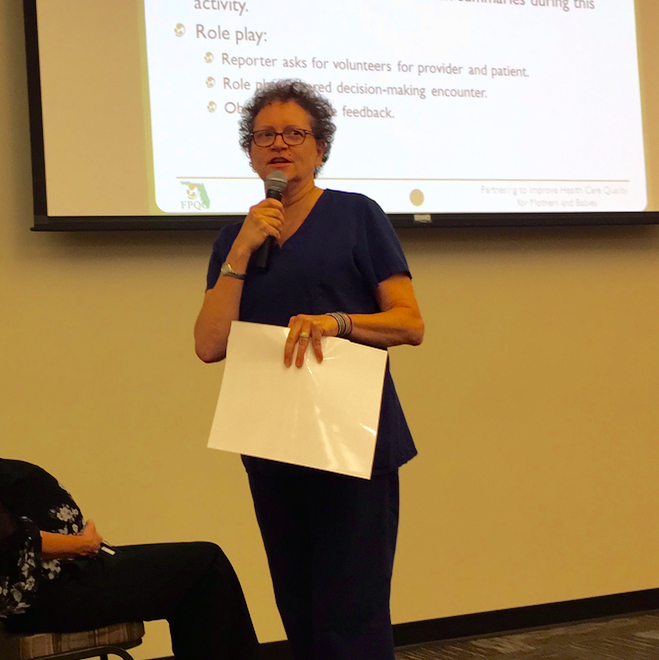PROVIDE Mid-Project Meeting Draws National QI Experts
Forty-five Florida hospitals are involved in Florida’s Promoting Primary Vaginal Deliveries (PROVIDE) Initiative, which seeks to reduce the number of women who deliver infants by cesarean section. On September 21, 2018, the Florida Perinatal Quality Collaborative sponsored a day of collaborative learning on the PROVIDE Initiative for Florida hospitals and guests from the New Jersey Perinatal Quality Collaborative.

Dr. Katy Berkowitz of the Cleveland Clinic, formerly a collaborative leader with the California Maternal Quality Care Collaborative, delivered the keynote address. Dr. Berkowitz offered lessons learned in the California initiative to support vaginal births and reduce primary cesarean deliveries, and used examples to offer advice for the quality journey in Florida. She also participated in a session with PROVIDE advisors that explored “A Randomized Trial of Induction Versus Expectant Management” (ARRIVE) findings and implications for practice in Florida.
Dr. William Sappenfield, Director of the USF Chiles Center, and Dr. Estefania Rubio, Data Manager for FPQC, shared data about the PROVIDE Initiative progress over the past nine months. Participating hospitals have seen a reduction of 8% in Nulliparous, Term, Singleton, Vertex (NTSV) Cesarean deliveries. PROVIDE hospitals have also demonstrated improvements in process and structural measures for the three focus areas: Fetal Heart Rate Concerns, Inductions, and Dystocia/Failure to Progress. Further, Apgar scores are an important balancing measure that remains unaffected by recent changes; meaning there have not been unexpected deleterious outcomes as a result of improvements in the PROVIDE Initiative process and structural measures.
Hospital participants shared their successes, challenges, and ideas for next steps in a facilitated session on key topics related to the initiative. They also posed questions to PROVIDE Advisors related to implementation and resistance to change. The exchange resulted in ideas that can be applied at the hospital level.
PROVIDE Initiative Clinical Co-Leads, Dr. Julie DeCesare and Dr. Karen Bruder, also led learning sessions. Dr. DeCesare and Margie Boyer RN used simulation exercises on Shared Decision Making that included audience participation to illustrate “what not to do” and how to engage patients in decisions regarding their care. Dr. Bruder reviewed the recommendations from FPQC on the ARRIVE Trial and facilitated the discussion with the attendees.

The day was closed by Dr. Sappenfield and Jessica Brumley CNM, PhD discussing Plan, Do, Study, Act (PDSA) cycles as a quality improvement tool. The use of PDSA cycles was illustrated with an example from Tampa General Hospital in the implementation of Intermittent Auscultation during labor for low-risk women.
Participants reported on the meeting evaluation survey that they enjoyed networking, understanding the data and what it represents, suggestions for physician engagement, and learning new approaches for reducing NTSV Cesareans including labor lounges, birth menus, and using rebozos. Participants were also excited when reminded that they can reach out to FPQC to schedule labor support trainings at their hospitals, and that the PROVIDE Initiative will be extended beyond 2019.
PROVIDE is funded by the Florida Department of Health’s Title V Block Grant, and the national Alliance for Innovation on Maternal Health (AIM) program.
For more information on the PROVIDE Initiative, visit our website.
